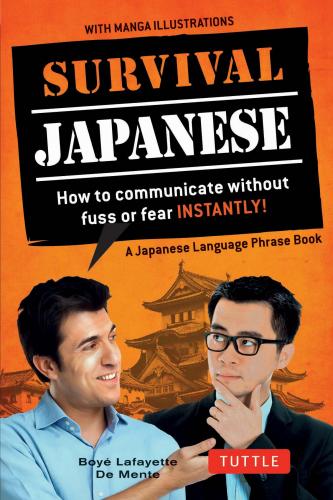Amerika-ni itta koto-ga arimasu-ka.
(Ah-may-ree-kah nee eet-tah koe-toe gah ah-ree-mahss kah) アメリカに いったことが ありますか。
GREETING PEOPLE
Good morning. (Said until about 11:00 a.m.)
Ohayō gozaimasu. おはよう ございます。
(Oh-hah-yoe go-zie-mahss)
Good afternoon.
(Said from around 11:00 a.m. until dusk.)
Konnichiwa. (Kone-nee-chee wah) こんにちは。
Note that konnichiwa is not used among family members or close friends, or between colleagues in their workplace.
Good evening. (Said from dusk.)
Konbanwa. (Kome-bahn wah) こんばんは。
Note that konbanwa is not used among family members or close friends, or between colleagues in their workplace.
Good night.
Oyasumi-nasai. おやすみなさい。
(Oh-yah-sue-me nah-sie)
► See you again tomorrow.
Mata ashita. (Mah-tah ah-ssh-tah) また あした。
► How are you?
O-genki-desu-ka. おげんきですか。
(Oh-gain-kee dess kah)
Note that Japanese do not say this to people they meet regularly or to strangers.
► I’m fine.
Genki-desu. (Gain-kee dess) げんきです。
► I’m fine, thanks to you. (A set expression.)
Ee, okagesama-de. ええ、 おかげさまで。
(Eeh-eh oh-kah-gay-sah-mah day)
This phrase is used in reply to o-genki-desu-ka (oh-gain-kee dess kah) It literally means “yes, thanks to you.”
► It’s been a long time, hasn’t it!
O-hisashiburi-desu-ne.
おひさしぶりですね。 (Oh-he-sah-she-buu-ree dess nay)
Shibaraku-desu-ne. しばらくですね。
(Shee-bah-rah-kuu dess nay)
► I’ve been out of touch for a long time!
Gobusata-shite-imashita. ごぶさたして いました。
(Go-buu-sah-tah she-tay ee-mah-sshtah)
This phrase is often used when meeting someone after having been out of touch for a long time and you feel a bit guilty.
FAMILY TERMS
► How is your wife?
Oku-san-wa ikaga-desu-ka.
(Oak-sahn wah ee-kah-gah dess kah)
おくさんは いかがですか。
► How is your husband?
Go-shujin-wa ikaga-desu-ka.
(Go-shuu-jean wah ee-kah-gah dess kah)
ごしゅじんは いかがですか。
► She/He is well, thank you.
Okagesama-de genki-desu. おかげさまで げんきです。
(Oh-kah-gay-sah-mah day, gain-kee dess)
| Your/Someone else... | My ... | |
| Wife | Oku-san(Oak-sahn)おくさん | Kanai(Kah-nie)かない |
| Husband | Go-shujin(Go-shuu-jean)ごしゅじん | Shujin(Shuu-jean)しゅじん |
| Child/children | O-ko-san(Oh-koe-sahn)おこさん | Kodomo(Koe-doe-moe)おこさん |
| Daughter(s) | O-jō-san(Oh-joe-sahn)おじょうさん | Musume(Muu-sue-may)むすめ |
| Son(s) | Musuko-san(Muu-sue-koe-sahn)むすこさん | Musuko(Muu-sue-koe)むすこ |
► How do you feel?
(Said to someone who has been ill.)
Go-kibun-wa ikaga-desu-ka?
(Go-kee-boon wah ee-kah-gah dess kah)
ごきぶんは いかがですか。
► I’m better now, thank you.
Okagesama-de yoku narimashita.
(Oh-kah-gay-sah-mah day yoe-kuu nah-ree-mah-sshtah)
おかげさまで よく なりました。
► Welcome.
Irasshaimase. (Ee-rash-shy-mah-say) いらっしゃいませ。
This is the polite, formal expression commonly used in an institutionalized way when welcoming people to your home, etc. It is also the expression that restaurant/bar staff and shop assistants traditionally call out when customers enter.
INTRODUCTIONS
| introduce | shōkai-suru しょうかいする(show-kie-sue-rue) |
| letter of introduction | shōkaijō しょうかいじょう(show-kie-joe) |
| name | namae (nah-mah-eh) なまえ |
| The similarity in spelling is coincidental. | |
| name-card | meishi (may-she) めいし |
► Let me introduce myself.
Jiko-shōkai sasete kudasai.
(Jee-koe show-kie sa-say-tay kuu-dah-sie)
じこしょうかい させて ください。
► My name is De Mente.
Watashi-no namae-wa De Mente-desu.
(Wah-tock-she no nah-mah-eh wah De Mente dess)
わたしの なまえは デ・メンテです。
De Mente-to mōshimasu. (more formal)
(De Mente toe moe-ssh-mahss)
デ・メンテと もうします。
In business this is the time when you present your name-card to the listener. When giving and receiving a name-card, it is good manner to hold it with both hands.
► What is your name?
O-namae-wa nan-desu-ka? おなまえは なんですか。
(Oh-nah-mah-eh wah nahn dess kah)
► Pardon me for asking your name. (more polite)
Shitsurei-desu-ga, dochira-sama-deshō-ka.
(She-t’sue-ray dess gah doe-chee-rah sah-mah day-show kah)
しつれいですが、 どちらさまでしょうか。
► Could you introduce me to that person, please?
Ano kata-ni shōkai-shite kudasaimasen-ka.
(Ah-no-kah-tah nee show-kie she-tay kuu-dah-sie mah-sen kah)
あの かたに しょうかいして くださいませんか。
► This is Mr. Tanaka.
Kochira-wa
